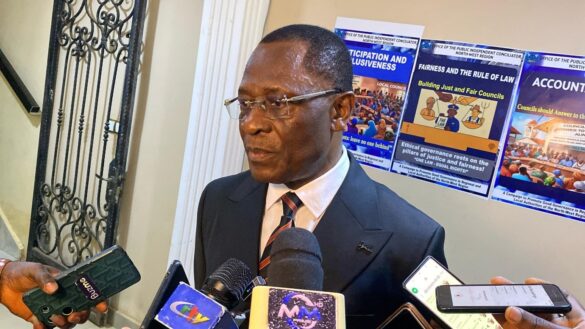By Ta Nformi Chris Mbunwe
On August 1, the Office of the Public Independent Conciliator (PIC) for the Northwest Region launched a three-month campaign aimed at fostering good governance across the Region.
Addressing a gathering of journalists, the Northwest’s Public Independent Conciliator, Tamfu Simon Fai, stated: “This campaign comes at a critical juncture in our collective efforts to strengthen ethical, citizen-centred governance in our regional and council administrations. Its purpose is clear: to nurture a culture of ethical leadership, participatory decision-making, integrity, transparency, accountability, and responsive service delivery.”
He explained that the initiative was prompted by observations that governance inefficiencies hinder community development, eroding public trust in regional and local authorities. The PIC’s campaign is rooted in the belief that citizens deserve institutions that reflect their values, address their needs, and uphold justice and equity.
Over the next three months, the PIC will focus on bridging the gap between councils and communities while empowering stakeholders with knowledge and tools. The office aims to establish lasting platforms for dialogue and collaboration as part of this initiative.
The campaign has several key objectives. First, it seeks to promote transparency and accountability in council operations while fostering inclusive governance through the active participation of traditional authorities, women, youth, persons with disabilities, and civil society. Another crucial aspect involves disseminating governance principles in accessible formats to improve public understanding and engagement across the region.
The PIC also plans to strengthen the capacity of council officials and grassroots actors to implement ethical, citizen-responsive policies. Monitoring and evaluating governance practices throughout the campaign period will help inform future reforms. Ultimately, the initiative aims to encourage a lasting culture of ethical governance in regional and local services through sustained dialogue and practical interventions.
Tamfu emphasised that the campaign will prioritise inclusivity, ensuring marginalised voices are heard and rebuilding trust between citizens and elected officials. The PIC will employ various communication strategies, using visual, interactive, and culturally resonant tools including posters, slogans, radio and television programmes, and newspaper features to educate and mobilise stakeholders effectively.
By the campaign’s conclusion, the PIC anticipates several important outcomes. These include stronger trust between citizens and local authorities, greater community engagement in governance processes, and the creation of sustainable governance tools such as posters and slogans that will continue to educate beyond the campaign period. The initiative also aims to establish a regional consensus on strategic governance priorities that can guide future administrative decisions.
“This is not just an event but a movement — one that must remain relevant and sustainable,” Tamfu declared. He called on the President of the Regional Executive Council, mayors, councillors, civil society organisations, and ordinary citizens to actively participate rather than remain passive observers. He stressed that elected officials must lead with integrity and champion inclusivity, while citizens should feel empowered to raise their voices and hold institutions accountable. The campaign, he said, should spark important conversations that have been avoided for too long. “Good governance is not a distant concept but a daily practice built on trust,” he added.
The PIC highlighted a notable success story from Ndu Council, where Mayor Abdou Borno Kanfon demonstrated exemplary ethical leadership. Upon assuming office, Mayor Kanfon discovered that previous administrations had been collecting excessive fees for civil status documents, accumulating up to FCFA 3 million. Following the PIC’s intervention, he redirected these funds into the state treasury, establishing a new standard for transparent governance.
“Some resist change, but let me warn them: we are not a toothless bulldog,” Tamfu asserted. He reminded potential offenders that the PIC possesses enforcement mechanisms, including legal avenues and cooperation with law enforcement agencies, to address malpractices. In the coming weeks, the campaign caravan will tour the region, reinforcing these governance principles and driving systemic change across Northwest Cameroon.

